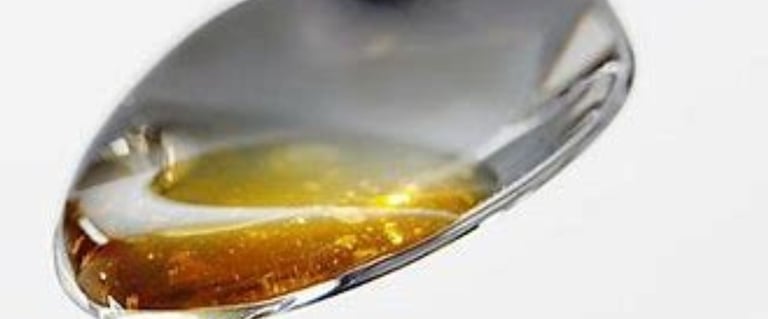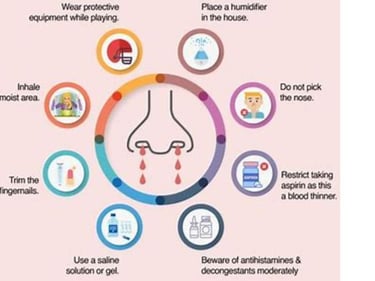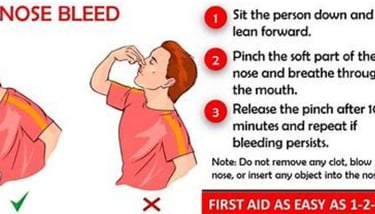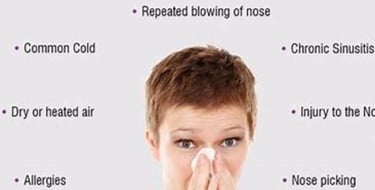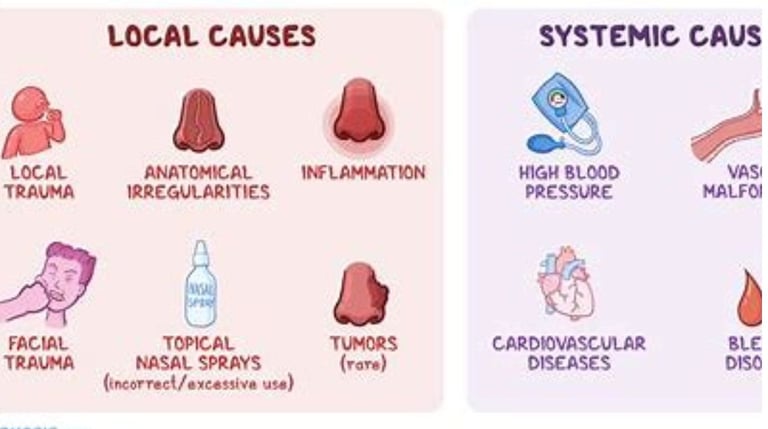
Health is a crown on the heads of the healthy that only the sick can see.
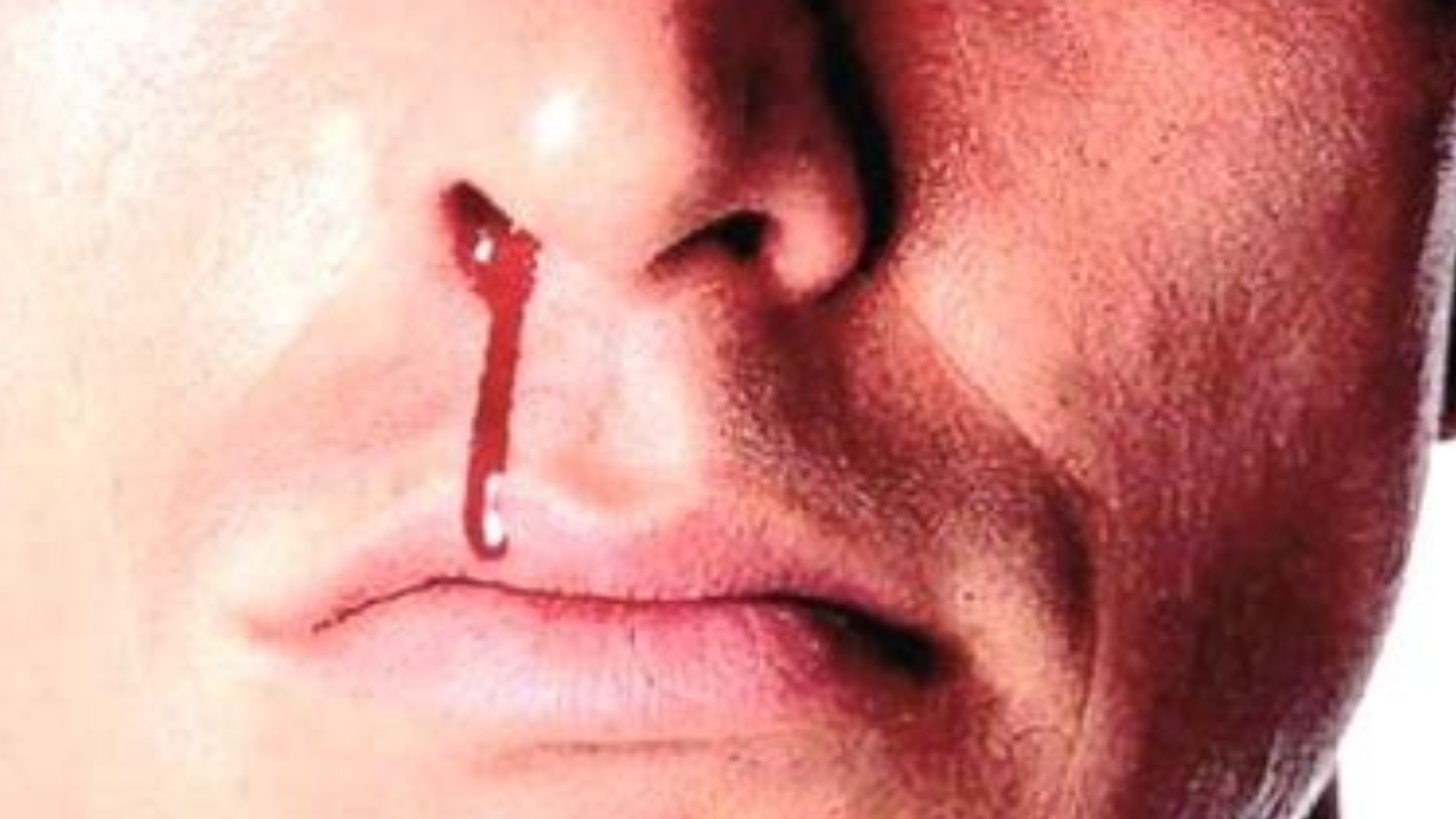
🍯 Healing Naturally Soothe and Stop Nosebleeds with Honey its hemostatic 🩺
Discover effective natural remedies for nosebleed symptoms, including anterior and posterior nosebleeds. Learn about fasting, the properties of honey, and other home treatments to manage nosebleeds and their causes such as high blood pressure and nasal injuries.
EAR NOSE AND THROATS OTOLARYNGOLOGY
Dr Hassan Al Warraqi


🍯 Healing Naturally Soothe and Stop Nosebleeds with Honey its hemostatic 🩺
🩺Discover effective natural remedies for nosebleed symptoms, including anterior and posterior nosebleeds. Learn about fasting, the properties of honey, and other home treatments to manage nosebleeds and their causes such as high blood pressure and nasal injuries.
Nosebleed (Epistaxis) ear nose and throats otolaryngology
Treating Nosebleeds With Honey
Nosebleed, also known as epistaxis, is a common occurrence that can happen to people of all ages.
It is caused by the rupture of a blood vessel in the lining of the nose.
Nosebleeds can be minor and stop on their own within a few minutes, or they can be more severe and require medical attention.
Causes of Nosebleeds
There are many different things that can cause a nosebleed, including:
Direct injury to the nose: This can happen from a blow to the face, picking the nose too hard, or inserting foreign objects into the nose.
Dry air: The lining of the nose can become dry and irritated, making it more likely to bleed.
High altitude: The air is thinner at high altitudes, which can also dry out the lining of the nose and make it more likely to bleed.
Certain medications: Some medications, such as blood thinners and decongestants, can increase the risk of nosebleeds.
Medical conditions: Certain medical conditions, such as high blood pressure, blood clotting disorders, and allergies, can also increase the risk of nosebleeds.
unknown cause where there is no obvious reason found .
Types of Nosebleeds
There are two main types of nosebleeds:
Anterior nosebleeds: These are the most common type of nosebleed and occur in the front of the nose. They are usually caused by minor injuries or dry air. Anterior nosebleeds can usually be treated at home.
Posterior nosebleeds: These are less common and occur in the back of the nose. They are often caused by more serious injuries or medical conditions. Posterior nosebleeds may require medical attention to stop the bleeding.
Treatment Options for Nosebleeds
Most nosebleeds can be treated at home with the following steps:
Sit down and lean forward slightly. This will help to prevent blood from running down the back of your throat.
Pinch the soft part of your nose just above your nostrils for 10-15 minutes.
Breathe through your mouth and spit out any blood that collects in your mouth. Do not swallow blood.
If the bleeding does not stop after 15 minutes, or if you have a posterior nosebleed, you should seek medical attention.
Natural Ways to Prevent Nosebleeds
There are a few natural ways that you can help to prevent nosebleeds, including:
Stay hydrated: Drink plenty of fluids to keep your nasal passages moist.
Use a humidifier: This can help to add moisture to the air and prevent the lining of your nose from drying out.
Avoid picking your nose: This can irritate the lining of your nose and make it more likely to bleed.
Use saline nasal spray: This can help to moisten the lining of your nose and reduce inflammation.
Eat a healthy diet: A diet that is rich in fruits, vegetables, and whole grains can help to improve your overall health and reduce your risk of nosebleeds.
there is few natural way of treatment which include :
fasting either islamic one from fajer to magib for few days after stop bleeding
intermittent fasting or other types of fasting
honey use
application of honey by finger in honey to one nostril and to the other one
application of honey in the mouth using toothbrush to clean tooth and gums the spit the remaining.
Rinsing and gargling of mouth to reach the areas of mouth cannot be reached with toothbrush. spit the rest of the honey in mouth.
try this free natural ways first before the others specially fasting and honey . frequent use of honey is harmless and free of side effects
key words
ear ,nose ,throats,otolaryngology, anterior,posterior,epistaxis,fasting ,honey, fruits, vegetables, grain, pinch, the nose, lean ,forward , Rinsing and gargling of mouth to reach the areas of mouth,free natural ways ,Frequent nosebleeds, often caused by dry air, high blood pressure, or blood thinners, usually involve anterior nosebleeds, the most common type, where blood vessels in the nose break. When a nosebleed occurs,
gently blow your nose to remove blood clots, then use a nasal spray and apply pressure for 15-20 minutes until the bleeding has stopped. If bleeding persists for more than 15 minutes or includes severe blood loss, seek emergency care. In some cases, treatments like a latex balloon may be used to stop the bleeding. Identifying the common cause of nosebleeds, such as dry air or underlying conditions, is essential for prevention.
FAQs About Nosebleeds and Their Treatment with Honey and Fasting
1. What are the main causes of posterior nosebleeds, and how serious are they compared to anterior nosebleeds?
Posterior nosebleeds are less common than anterior nosebleeds but can be more serious.
Causes include high blood pressure, atherosclerosis, liver and kidney diseases, use of blood thinners, nasal injuries, sinus infections, allergic rhinitis, deviated septum, tumors, or unknown causes.
They are considered more dangerous because they can be harder to control.
2. What symptoms might accompany a posterior nosebleed that require medical attention?
Symptoms include heavy bleeding from one or both nostrils, blood dripping down the throat, difficulty breathing, dizziness or lightheadedness, coughing up blood, spitting blood, or swallowing blood.
If the bleeding persists after 20 minutes of home treatment, or if it is severe and accompanied by symptoms like difficulty breathing or dizziness, immediate medical attention is required.
3. What home remedies can be used to treat posterior nosebleeds, and when should you see a doctor?
Home remedies include:
Sitting upright and leaning slightly forward.
Pinching the nose below the bridge for 10–15 minutes.
Applying an ice pack to the bridge of the nose for 10–15 minutes.
Avoiding blowing or rubbing the nose.
You should see a doctor if the bleeding does not stop after 20 minutes of home treatment or if it is severe and accompanied by other symptoms.
4. What medical treatments might a doctor use to treat posterior nosebleeds?
Medical treatments may include:
Nasal packing with gauze or other materials to apply pressure to the bleeding vessels.
Cauterization using heat or electric current to seal the blood vessels.
Embolization by injecting a substance into the blood vessel to block it.
Surgery in rare cases.
Use of a Foley catheter to apply pressure to the bleeding site.
5. How can posterior nosebleeds be prevented?
Preventive measures include:
Controlling blood pressure.
Taking blood thinners as prescribed.
Avoiding nasal injuries.
Treating sinus infections promptly.
Maintaining a healthy lifestyle, including a balanced diet, regular exercise, and adequate sleep.
6. How can honey be used as a natural remedy for oral and dental problems, and what are its benefits?
Honey is used as a natural remedy for oral problems due to its antibacterial, antiviral, antifungal, and anti-inflammatory properties.
It can be used to treat mouth ulcers, gum disease, plaque, and tartar buildup.
It can be used as a mouthwash or applied directly to affected areas several times a day.
Studies have shown that honey is as effective as traditional mouthwash and can be used to clean teeth, gums, and the roof of the mouth.
7. How can honey be used to treat nosebleeds, and are there any side effects?
Honey can be used to treat nosebleeds by rubbing it inside the nose with your fingers.
Honey is generally safe for most people, but some may experience allergic reactions.
It is important to consult a doctor if any abnormal reactions occur.
8. What is the relationship between fasting and nosebleeds, and what types of fasting can help in treatment?
Fasting is considered a natural method that may help treat nosebleeds, including Islamic fasting (from dawn to dusk), intermittent fasting, and other types of fasting.
Fasting is believed to help regulate blood pressure and reduce inflammation, which may decrease the occurrence of nosebleeds.
It is recommended to try natural remedies, especially fasting and honey, before resorting to other treatments.
By combining natural remedies like honey and fasting with medical advice, individuals can manage nosebleeds more effectively and improve their overall well-being. Always consult a healthcare professional for persistent or severe cases.
Keywords
posterior nosebleed, anterior nosebleed, high blood pressure, atherosclerosis, liver and kidney diseases, blood thinners, nasal injuries, sinus infections, allergic rhinitis, deviated septum, tumors, nosebleed symptoms, home remedies, medical treatments, nasal packing, cauterization, embolization, surgery, nosebleed prevention, honey, properties of honey, antibacterial, antiviral, antifungal, anti-inflammatory, mouth ulcers, gum disease, plaque and tartar, fasting, Islamic fasting, intermittent fasting, blood pressure regulation, reducing inflammation, natural remedies, consulting a doctor.
Epistaxis: Causes, First Aid, Treatment, and Prevention
Epistaxis, commonly known as a nosebleed, is a frequent condition affecting both children and the elderly.
While it is often benign and manageable at home, some cases can be severe, requiring medical intervention.
This article provides a comprehensive overview of the causes, types, first aid measures, treatments, and prevention strategies for epistaxis, optimized for search engines (SEO) with keywords such as "nosebleed treatment," "epistaxis causes," and "natural remedies for nosebleeds."
Types of Epistaxis
Anterior Epistaxis:
The most common type (90% of cases).
Occurs in the front part of the nose and is typically treatable at home.
Posterior Epistaxis:
Less common but more serious.
Often requires medical intervention.
Causes of Epistaxis
Common Causes: Dry nasal passages, nose picking, trauma, allergies.
Medical Causes: Blood clotting disorders, hypertension, medications (e.g., blood thinners).
Environmental Causes: Dry air, smoking, high altitudes.
Seasonal Causes: Dehydration during Ramadan.
Risks of Epistaxis
Anemia due to repeated or heavy blood loss.
Swallowing blood in posterior epistaxis, which may cause nausea or stomach upset.
Rare complications, such as stroke or breathing difficulties.
First Aid for Epistaxis
Sit upright and lean slightly forward to prevent blood from flowing down the throat.
Gently blow the nose to remove clots.
Pinch both nostrils for 10-15 minutes while breathing through the mouth.
Apply a cold compress to the forehead or bridge of the nose.
Use a decongestant nasal spray (e.g., oxymetazoline) if necessary.
Avoid picking the nose or forceful blowing after the bleeding stops.
When Is Epistaxis Dangerous?
Seek immediate medical attention if:
Bleeding persists for more than 20-30 minutes.
There is significant blood loss or difficulty breathing.
Dizziness, fainting, or bleeding results from trauma.
Recurrent bleeding or accompanying symptoms (e.g., heart palpitations, pallor).
Bleeding occurs in children under 2 years old.
Treatment of Epistaxis
Home Treatment
Pinching the nose and using saline gel for hydration.
Applying a small amount of honey to moisturize and soothe the nasal passages.
Medical Treatment
Cauterization: Using silver nitrate or laser to seal blood vessels.
Nasal Packing: Inserting gauze or an inflatable balloon to apply pressure.
Surgery: In rare cases, to address underlying issues like a deviated septum.
Natural Remedies
Nettle: Astringent properties to constrict blood vessels.
Rosehip Extract: Soothes recurrent bleeding.
Cayenne Pepper: Regulates blood flow.
Vitamins K and C: Found in thyme, parsley, oregano, to support clotting and vessel health.
Honey: A natural remedy with anti-inflammatory, antibacterial, and moisturizing properties.
Role of Fasting
Fasting, particularly intermittent fasting or during Ramadan, may positively impact epistaxis for several reasons:
Reducing Inflammation: Fasting can lower systemic inflammation, which may affect nasal blood vessels, indirectly reducing epistaxis frequency.
Improving Circulation: Fasting allows the body to focus on healing, potentially improving blood flow and aiding recovery from epistaxis-prone tissues.
Blood Pressure Control: Some studies suggest fasting may lower blood pressure, which can help if epistaxis is linked to hypertension.
Consult a doctor before fasting if you have hypertension, as medications and lifestyle changes are critical.
Cellular Repair: Fasting promotes autophagy (the body’s process of clearing damaged cells), which may enhance tissue repair in the nasal passages, reducing the likelihood of epistaxis due to weak or damaged blood vessels.
Hydration During Non-Fasting Hours: Proper hydration during breaking the fast can prevent nasal dryness, a common cause of epistaxis.
However, caution is needed during Ramadan to avoid dehydration, which may exacerbate nosebleeds.
Prevention
Use a humidifier to maintain nasal moisture.
Apply saline gel or petroleum jelly to the nasal passages.
Avoid nose picking or forceful blowing.
Manage chronic conditions like hypertension.
Ensure adequate hydration, especially during Ramadan.
Using Honey as a Natural Remedy for Epistaxis
Honey is a promising natural treatment for mild anterior epistaxis due to its therapeutic properties.
Below is a detailed look at its role, mechanism, and application, optimized for SEO with keywords like "honey for nosebleeds," "natural epistaxis remedies," and "benefits of honey for nasal health."
Beneficial Properties of Honey for Epistaxis
Honey, a natural substance produced by bees, has healing properties that make it a potential remedy for nosebleeds:
Anti-Inflammatory Properties: Contains flavonoids and antioxidants that reduce inflammation in the nasal mucous membranes, which may trigger bleeding.
Antibacterial Properties: Especially in Manuka honey, it prevents infections in case of cuts or cracks in the nasal lining.
Moisturizing Effect: Acts as a natural humectant, keeping nasal passages hydrated and reducing dryness, a common epistaxis trigger.
Wound Healing: Promotes tissue repair, helping to close small damaged blood vessels in the nose.
Rich in Nutrients: Contains small amounts of vitamin C and minerals like potassium, supporting blood vessel health.
How Honey Helps Treat Epistaxis
Reduces Irritation: Soothes inflamed nasal membranes caused by allergies or dryness, preventing vessel rupture.
Prevents Dryness: Topical application maintains nasal moisture, reducing mucosal cracking.
Aids Clotting: While not a substitute for clotting factors, its anti-inflammatory and moisturizing properties help manage minor bleeding.
Infection Protection: Prevents infections in nasal wounds or scratches, promoting healing.
How to Use Honey for Epistaxis
Note: Honey is primarily suitable for mild anterior epistaxis. For posterior or severe bleeding, seek medical attention immediately. Here are effective methods:
Topical Application Inside the Nose:
Steps:
Wash hands thoroughly and ensure the nose is clean.
Use raw honey (preferably Manuka for its antibacterial properties).
Apply a small amount of honey (pea-sized) to a clean cotton swab or fingertip.
Gently insert into the anterior part of the nostril, avoiding deep insertion.
Leave for 5-10 minutes, then rinse gently with lukewarm water if needed.
Frequency: 1-2 times daily for 2-3 days to relieve dryness or irritation.
Precautions: Test for allergies by applying honey to the skin (e.g., wrist) and waiting 24 hours.
Honey with Herbs:
Mix honey with herbs like basil or coriander juice for enhanced soothing effects.
Method: Combine 1 tsp of honey with a few drops of fresh basil juice, apply to the nose with a cotton swab, leave for 5 minutes, then rinse.
Oral Consumption:
Consuming 1 tsp of honey daily (mixed with warm water or herbal tea) supports overall blood vessel health due to antioxidants.
First Aid with Honey
For minor nosebleeds, combine honey with traditional first aid:
Sit upright and lean forward.
Pinch nostrils for 10-15 minutes.
Apply a cold compress to the nose bridge.
After bleeding stops, apply a small amount of honey to moisturize and prevent recurrence.
Honey vs. Other Natural Remedies
Compared to other natural remedies for epistaxis:
Honey: Focuses on hydration and inflammation reduction, safe for topical use.
Nettle/Cayenne Pepper: Emphasize clotting and blood flow regulation but are less suitable for topical application.
Basil/Coriander: Similar soothing properties but less effective for hydration.
Preventing Epistaxis with Honey
Nasal Hydration: Apply a thin layer of honey daily in dry climates to prevent mucosal cracking.
Vascular Health: Regular honey consumption supports blood vessels via antioxidants.
Avoid Irritants: Use honey as a natural alternative to chemical nasal moisturizers.
Conclusion
Epistaxis is a common condition that can often be managed at home with proper first aid, such as pinching the nose and applying cold compresses.
Severe cases, however, require medical attention.
Natural remedies like nettle, rosehip, cayenne pepper, and honey offer relief for mild cases, with honey standing out for its anti-inflammatory, moisturizing, and antibacterial properties.
Fasting may help reduce inflammation and improve vascular health, but dehydration during Ramadan requires careful hydration.
Prevention, including nasal hydration and avoiding irritants, is key to reducing epistaxis. For recurrent or severe nosebleeds, consult a healthcare professional to identify underlying causes and receive appropriate treatment.
Treating Nosebleeds With Honey
Dr. Hassan Al Warraqi:
Role: Lead author/contact for h-k-e-m.com, owned by “Hakim.”
Expertise: Specializes in natural treatments, fasting, and neurogenesis, likely promoting remedies like honey for their anti-inflammatory and healing properties. He might discuss honey’s role in mucosal health or inflammation reduction, aligning with nosebleed management.
Relevance: His focus on holistic health suggests h-k-e-m.com could explore honey as a natural remedy for minor ailments like nosebleeds, possibly citing its traditional use or wound-healing studies.
Contact: hassan@h-k-e-m.com
Other Authors: Without h-k-e-m.com access, I can’t confirm additional authors. Credible contributors would likely have credentials in otolaryngology, naturopathy, or pharmacology (e.g., MD, ND, PharmD) and cite studies like those in Journal of Ethnopharmacology. If other authors exist, their bios should detail relevant expertise.
Actionable Advice: If you provide specific author names or articles from h-k-e-m.com, I can cross-check credentials or analyze claims against evidence. I can also search X or LinkedIn for profiles if needed.
